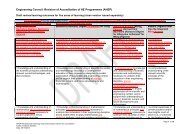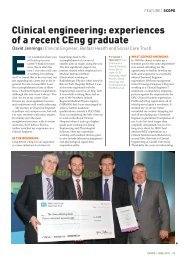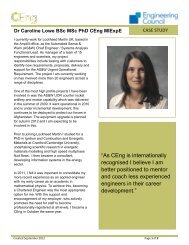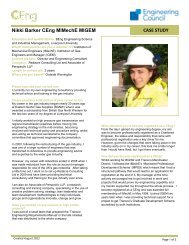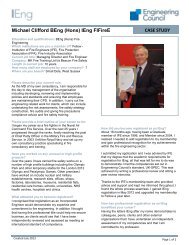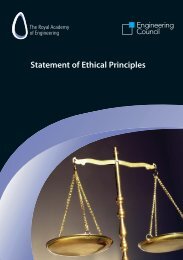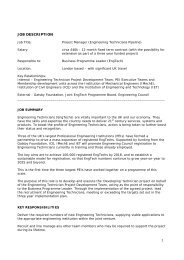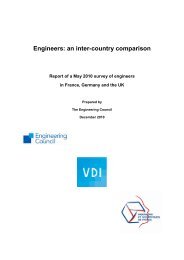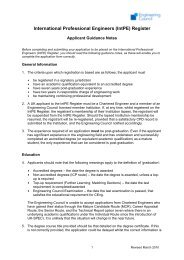An Engine for Change - A Chronicle of the Engineering Council
An Engine for Change - A Chronicle of the Engineering Council
An Engine for Change - A Chronicle of the Engineering Council
Create successful ePaper yourself
Turn your PDF publications into a flip-book with our unique Google optimized e-Paper software.
1999-2001: THE HAWLEY YEARS 149in Science and Technology (CREST) projects, and Young <strong>Engine</strong>ers’ Clubs. The Junior<strong>Engine</strong>ers <strong>for</strong> Britain competition enabled <strong>the</strong> Neighbourhood <strong>Engine</strong>ers programme to morethan double <strong>the</strong> number <strong>of</strong> primary schools with which it was involved.The Neighbourhood <strong>Engine</strong>er Programme Managers held a conference at Heriot WattUniversity, Edinburgh in October 1999 to discuss issues, share ideas and promote bestpractice.At its October 2000 meeting <strong>the</strong> BEP accepted <strong>the</strong> Brookbridge Report measuring <strong>the</strong> impactand efficiency <strong>of</strong> <strong>the</strong> NEP. A programme <strong>of</strong> improvement to <strong>the</strong> management <strong>of</strong> <strong>the</strong>programme was unanimously agreed. The NEP central management team took delivery <strong>of</strong>new communications material to assist local NEP managers in promoting <strong>the</strong> scheme toschools, engineers and employers.Two major NEP conferences were held during 2000 in Wakefield and Bournemouth coveringtopics such as <strong>the</strong> Headstart Programme, Data Protection/Child Protection Regulations and<strong>the</strong> implication <strong>for</strong> <strong>the</strong> NEP <strong>of</strong> <strong>the</strong> new Learning and Skills <strong>Council</strong>s.Then in 2001, in line with <strong>the</strong> strategy <strong>of</strong> <strong>the</strong> new <strong>Engine</strong>ering and Technology Board (ETB)– see later in this Chapter – management <strong>of</strong> <strong>the</strong> NEP was transferred to SETNET as part <strong>of</strong><strong>the</strong> overall Science and <strong>Engine</strong>ering Ambassadors’ initiative which SETNET had been askedto manage by <strong>the</strong> DTI.Young <strong>Engine</strong>ers <strong>for</strong> BritainOver 1,400 young people aged 7 to 25 years entered models, projects and inventions <strong>for</strong> <strong>the</strong>2000 YEB competition. The National final held at <strong>the</strong> Millennium Dome in London was aprestigious showcase <strong>for</strong> <strong>the</strong>ir talent, ingenuity and achievement. The title ‘Young <strong>Engine</strong>er<strong>for</strong> Britain 2000’ was won by Louise Elliott (17) from St Aidan’s and St John FisherAssociated Sixth Form College with her project ‘THE BUG’, a highly manoeuverableoutdoor buggy <strong>for</strong> a disabled child. The winners <strong>of</strong> <strong>the</strong> ‘Junior <strong>Engine</strong>ers <strong>for</strong> BritainChallenge’ were Jordan Dobbie (10) and Susan Johnstone (11), both from Beith PrimarySchool, who constructed a solar powered robot. The winners received <strong>the</strong>ir awards fromHRH The Duke <strong>of</strong> Kent. The year 2000 competition was generously sponsored by manycompanies and received extensive media coverage on television, radio and <strong>the</strong> national press,in addition to specialist and Institution publications.The 2001 National Final was held on 10-12 September at <strong>the</strong> Business Design Centre,Islington with a top prize <strong>of</strong> £5,000 going to <strong>the</strong> winners Brendan Quinn and Edna Youngfrom St Patrick’s College, Maghers <strong>for</strong> <strong>the</strong>ir winning idea ‘Self Sustained Induction Deferrer’(SID). This was an automatic pod to scare away birds sitting on power lines, using powerfrom <strong>the</strong> line to propel <strong>the</strong> pod along <strong>the</strong> cable.In line with <strong>the</strong> strategy developed <strong>for</strong> <strong>the</strong> <strong>for</strong>thcoming ETB (see later in this Chapter),responsibility <strong>for</strong> <strong>the</strong> YEB programme was transferred from <strong>the</strong> EngC to ano<strong>the</strong>rorganization, ‘Young <strong>Engine</strong>ers’ (YE), with effect from 1 January 2002. YE ran <strong>the</strong> ‘Young<strong>Engine</strong>ers Clubs’ and was set to manage <strong>the</strong> YEB and JEB events <strong>for</strong> 2002 onward.© <strong>Engine</strong>ering <strong>Council</strong> UK 2004



